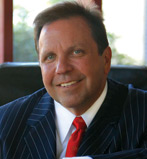Showing Up To Work
Cal Ripken Jr. committed to being better at his craft. Every day. For two decades.
Setting an example is not the main means of influencing others; it is the only means.
Albert Einstein
If Albert Einstein was right, Cal Ripken should have been a CEO or politician rather than a shortstop,because Ripken led by example over and over… and over again.
Despite being one of only eight players in baseball history to record 400 home runs while collecting more than 3,000 hits, despite the fact that he won two most valuable player awards and appeared in 19 All-Star Games, his lifelong Baltimore Orioles legacy will always be most closely linked to one thing: “I had a good attendance record,” he says with a smile.
In a 21-year career as a major league baseball player, Ripken is best known as the Iron Man of his sport. Beginning in May 1982, Ripken played in 2,632 consecutive baseball games; a streak many believe will never be eclipsed. The previous record for consecutive games played, held by New York Yankees legend Lou Gehrig, stood at 2,130 games. That record was on the books for more than five decades.
There have been few days since the Hall of Fame short stop set the consecutive games mark in 1995 when he has not been asked about the achievement. And no one is above asking.
In the preface to his 2007 book Get in the Game, Ripken tells about a conversation in the dugout during the 1998 All-Star Game. Derek Jeter, now a perennial all-star for the New York Yankees, was playing in his first midsummer classic. He leaned in to ask Ripken, “What’s the secret of playing every day? How do you do it?”
Ripken’s answer to young Jeter was the same then as it has been for the last 11 years. “You know, Derek, I just… I just play.”
As unspectacular as the answer might seem, Ripken says he’s grown to realize he has to amend it a little. “I didn’t just show up for work, as has sometimes been said. I also showed up to work.”
The distinction, Ripken says, sitting in the offices of his baseball complex outside of Baltimore, is that he didn’t just clock in; he made sure he was getting better at his craft every day. And that is tough to do over two decades in any job.
“I think the numbers will back me up,” Ripken says. “I worked at my game, worked on my weaknesses. I wanted to make sure that I wasn’t just on the field, but that I was a contributor every time I was out there.”
Making Yourself Indispensable
The numbers do bear him out: In 1978, as a rookie minorleague shortstop for the team in Bluefield, W.Va., Ripken committed a league-leading 33 errors. Some worried that Ripken, a powerful pitcher in high school, might not be suited for a spot in the infield and the everyday roster. Yet through practice and repetition—making a habit of staying on the practice field longer than any teammate he was competing against for a roster spot—Ripken became one of baseball’s all-time best at his position. During the season when he edged close to the record for most consecutive games played, Ripken set another record, becoming the first shortstop in the history of baseball to play 95 straight games without committing an error. He mishandled only three plays that entire season, the best mark in baseball.
“I think it’s important, especially in this economy, to see that you can’t stay around if you’re not getting better,” Ripken says. “No business or baseball team is going to keep people just because they show up. You have to constantly be looking for ways to get better, looking for ways to improve your value to the organization. You have to develop strong fundamentals—no matter what you do—and you have to make yourself indispensable. That requires you to constantly be evaluating what you’re doing and what needs to be done.”
That work ethic became Ripken’s true calling card. He became a legend for showing up at spring training in midseason condition and never seemed to tire as he fielded one ground ball after another during pre-game warm-ups. Younger players found it impossible to keep up, even as Ripken became one of the game’s “graybeards” at age 41. “That was stubbornness as much as anything else,” he says of his unwillingness to let men half his age outwork him. “Sometimes, stubbornness is a negative. It was a positive for me.”
The other great lesson Ripken believes his streak taught others is the value of conditioning. Though he played one of the most physically demanding positions on the field for most of his career, Ripken escaped serious injury. At times, his ability to avoid that bug became a point of humor for those around him. “Sometimes when he gets hit by a pitch,” the team’s trainer, Richie Bancells once famously said, “I’m almost embarrassed to ask him about it. By the time he gets back to the dugout, the bruise is gone!”
Passing on the Lessons
As his career wound toward its close, he immediately began looking for new ways to pass along those lessons. Since retiring from baseball in 2001, Ripken developed several ways to deliver that message with both business executives and Little Leaguers. He began by building his Ripken Academy, a training and competition complex in his hometown of Aberdeen, Md., 30 miles from Baltimore. The original goal of the facility was to help Ripken grow baseball at the grass-roots level, but it has also become home to one of three minor league teams Ripken Baseball Inc. has purchased. Through their company, Ripken and his younger brother Bill have a goal of adding seven additional minor league baseball teams to their business portfolio over the next seven years.
He also has built the Cal Ripken Sr. Foundation, named for his father. The foundation works with at-risk youth in communities throughout the country to clean up and rehab ballparks, and create safe and secure places for those children to play baseball and softball. The goal is to teach them how to play “the Ripken way,” which the foundation defines as centered around four fundamentals: Keep the game simple, especially for younger players; explain why certain skills are taught when the players ask; make the teaching of fundamentals fun; and celebrate the individual by recognizing that no two players are alike. “
The four principles are the way my father taught me the game and the way that I taught the game to my children,” says Ripken, father of a son and a daughter. “Passing the principles along is a great way to honor my father. Baseball gave me and our family so much, that finding ways like this to work with the game to give back just made sense.”
And through his work as a speaker and author, Ripken has found additional platforms to explain that the game of baseball serves as a great metaphor for life, teaching invaluable lessons to others based on what he’s learned from a lifetime in the game.
“My father was a baseball coach and I watched him as I grew up, and he did things right and expected others to do things right,” says Ripken, who played for his dad. “He never cheated the game of baseball by not giving his best, and I learned that great lesson from him. He also took time to answer all of my questions about what he did and the coaching decisions he made. That didn’t just teach me the game, it taught me how to communicate with others, which I think made me a better teammate later on and made me more valuable to the team.”
Additionally, Ripken says his father made a point of teaching his son to positively direct his competitiveness. “If he hadn’t,” the still-imposing Ripken says, “I probably would have developed a temper, and would have gotten into it on occasion with another player or an umpire… and maybe I’d have been suspended and wouldn’t have played in all those consecutive games.
“Then what would we be talking about?” he adds with a laugh.
It Was Never About the Record
Although it’s unlikely anyone will supplant Ripken as holder of the consecutive-games-played record, he says, “I believe it will happen. No record lasts forever. In fact, when Lou Gehrig played the last game of his streak [in 1939], several newspapers said it was a record that wouldn’t be broken.”
Ripken says there were times he was shocked at all the attention his streak was receiving. “I guess it was because people looked at it as such an ‘old-school’ event, a sort of celebration of the way things used to be,” he says. “It reminded people of the days when people worked and toughed it out. I guess that’s why so many people felt like they could relate to it.”
The chase for the record also allowed many younger fans to become acquainted with Gehrig, who was known as the Iron Horse when he played for the Yankees. To provide perspective about the enormity of Ripken’s accomplishment, a number of publications and network television channels offered profiles of Gehrig, who stopped playing only because he was diagnosed with amyotrophic lateral sclerosis (ALS).
Among the things he and Gehrig shared, Ripken says, was that neither of them was driven by the record.
Another connection between the all-stars is the Cal Ripken/Lou Gehrig Fund for Neuromuscular Research, which Ripken established in 1995 with $2 million he helped raise by working with the Johns Hopkins School of Medicine, the Orioles and a group of Baltimore businessmen.
“Gehrig was as good a man as he was a player, and if it hadn’t been for the disease there’s no telling how many games he would have played in,” Ripken says. “Neither of us had setting that record as a goal. If we had, I can’t imagine that it would have happened. The record isn’t why we played, it isn’t who we are. It may be the thing most people know about me and maybe about him, but it wasn’t why we played. We just did what we were hired to do, and we knew that part of being a good teammate was being someone others could count on. Being there every day allowed them to count on us.”
Ripken says that central to his longevity has been his love for the job. “That’s key to success in anything,” he says. “Find what you enjoy, then showing up to do it isn’t anything special.”
Tags: Success Magazine, Writing






